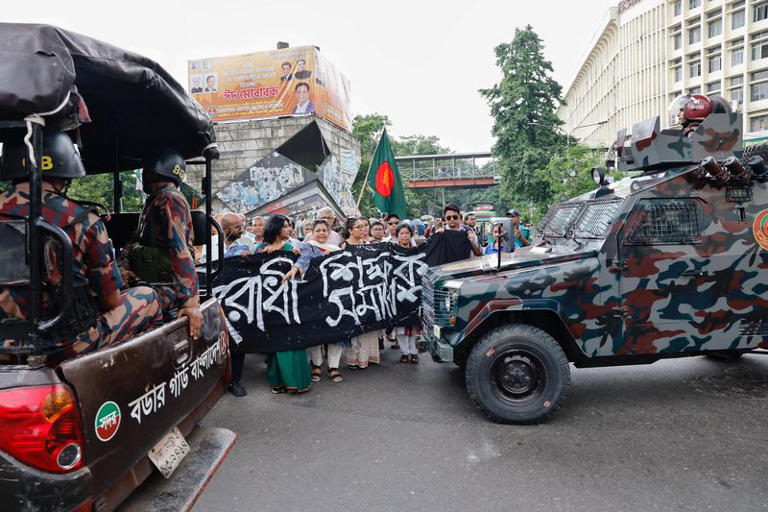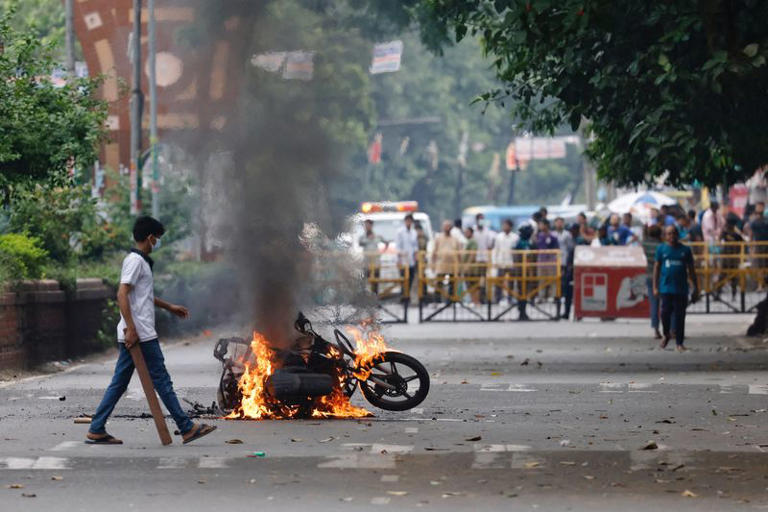Bangladesh Closes Universities Following Deadly Protests
News Desk
Dhaka: Bangladesh has announced the indefinite closure of all public and private universities starting Wednesday after student protests against a government job quota system turned deadly, resulting in at least six fatalities and numerous injuries this week.
The nation has been engulfed in protests for weeks over the quota system, which reserves 30 percent of government jobs for family members of freedom fighters from the 1971 War of Independence from Pakistan.
This policy has sparked outrage among students facing high youth unemployment rates, with nearly 32 million young Bangladeshis not engaged in work or education out of a population of 170 million.
Tensions escalated after Prime Minister Sheikh Hasina refused to meet the protesters’ demands, citing ongoing court cases, and labeled the opposition as “razakar,” a term used for alleged collaborators with the Pakistani army during the 1971 war.
Violence erupted this week when thousands of anti-quota protesters clashed with members of the student wing of the ruling Awami League party nationwide. Police deployed rubber bullets and tear gas to disperse the crowds.
The clashes on Tuesday resulted in six deaths, including at least three students, according to police reports.

Amnesty International urged the Bangladesh government to ensure the safety of all peaceful protesters and provide proper treatment for the injured. Authorities have since deployed riot police and the Border Guard Bangladesh paramilitary force to university campuses to maintain order.
Late Tuesday, the University Grants Commission ordered the closure of all universities and instructed students to vacate the premises immediately for their safety. High schools, colleges, and other educational institutions were also shut down.
Read More: https://thepenpk.com/dar-urges-safety-for-pakistani-students-amid-bangladesh-protests/
Nahid Islam, the coordinator of the anti-quota protests, announced plans for students to hold processions on Wednesday, carrying coffins in solidarity with those who lost their lives.
A female student from Dhaka University, speaking anonymously due to fear of reprisal, noted that many students have left dormitories out of fear of attacks by ruling party student wing members, but some remain, especially in the men’s dormitories.
In a related incident, police raided the headquarters of the main opposition party, the Bangladesh Nationalist Party (BNP), in Dhaka around midnight on Tuesday and arrested seven activists, including a former leader of its student wing.

The raid followed a bus fire near the BNP office, during which police claimed to have recovered 100 crude bombs and several bottles of petrol. Ruhul Kabir Rizvi, BNP’s senior joint secretary, condemned the raid, accusing the government of planting the items to discredit the protests.
These protests present the first significant challenge to Hasina’s government since her fourth consecutive term began in January, following an election boycotted by the BNP.
Experts attribute the unrest to stagnant job growth in the private sector, making government jobs increasingly desirable due to their regular wage hikes and other privileges.
Currently, 56 percent of government jobs in Bangladesh are reserved under various quotas, including 10 percent for women, 10 percent for people from underdeveloped districts, 5 percent for indigenous communities, and 1 percent for people with disabilities.

Comments are closed.